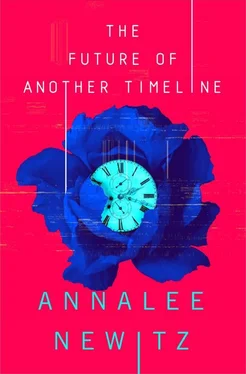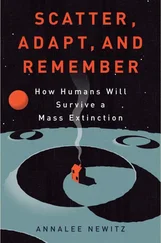Morehshin eyed the flower-fire stones that Hugayr was slipping back into her robe, then addressed her in a language I couldn’t understand.
“Is that English?” Hugayr cocked her head, and spoke with her southern accent again. “I’m afraid I only speak Atomic Era.”
“Where did you get those multi-tools?” Morehshin switched back to Nabataean.
Hugayr readjusted her shawl and glared at Morehshin. “This temple belongs to the Raqmu women and new genders of its time. Do you understand? We shelter the Timeless, but it is our place . You get no special privileges because you are from the future. If you want to learn our secrets, you must join us and never travel again.”
Looking sheepish, Morehshin took out her own multi-tool and showed it to Hugayr. “Do you mind if I ask you some questions about this?” Immediately the tension evaporated and they got into a long, muttered discussion about its technical features.
Ignoring them, C.L. nudged Anita and pointed up to the spot where Soph had been eaten by lightning. “It’s a Machine that only leads to its present. Isn’t that cool? Probably a beta test that somebody forgot to turn off half a billion years ago.”
“What makes you so sure it isn’t magic?” Soph jumped off the dais, stripped off her wet robe, and took a fresh tunic and trousers from one of Hugayr’s students.
“Because it always works the same way every time. It’s repeatable.” C.L. sounded extremely certain.
“Isn’t that what a magic spell is?” Soph retorted.
Anita rolled her eyes.
Hugayr’s student began piling the remaining cloths into a basket. “Sorry to interrupt, but I should show you to the dormitory.” She glanced at us. “Timeless and priestesses only.”
“Are you a priestess?” Soph asked.
“I will be one day. Hugayr is training me.”
“Well, according to your training, would you say that what we experienced here was magic or science?”
The student shot a neurotic look over her shoulder at Hugayr. “I’m not sure what you mean by ‘science.’” Soph had used two Nabataean words that translated more literally as “knowledge device.”
“Do you know the word ‘science’?” C.L. said the word in English.
The student shrugged and continued in Nabataean. “I haven’t started English yet. But I speak Hebrew and Greek.”
“What about Plato? Do you know him? We’re talking about his idea of logical deduction.” C.L.’s Nabataean was terrible, but the student understood them.
“Plato hates women. His work is useless to us.”
“I don’t mean him. I mean his method.”
“Talking to other men to discover truth?”
I snickered. She had a point. C.L. frowned at me.
Anita broke in and tried to restate the question so it made more sense in Nabataean. “I think Soph was asking whether you think this is a spirit or a mechanical device.” She pointed at the dais.
“Oh, I see.” The student set down her basket. “We discuss this question often. It is one way to contemplate the three faces of al-Lat, who represents many kinds of power in one woman. She is an engineer, she is a mother, and she divines the answers to cosmic mysteries. So I guess… sometimes she is a mechanical device, and sometimes she is a spirit.”
“That was very well said, Ahed.” Hugayr had been eavesdropping.
Ahed bowed her head respectfully and fought to suppress a pleased smile. “Thank you, Priestess.”
“And thank you, Ahed. I’m ready to see my new home.” Soph scooped up the basket of wet fabric and linked arms with the student. “Should we drop this off at the laundry?”
“Yes, let’s do that.”
Hugayr nodded at us. “Well met, travelers. I believe we still have something to discuss.”
We sat on cushions in her chambers and Anita presented our case. “We think there are men who are trying to destroy the Machines.” She paused, searching Hugayr’s impassive face. “I have heard… you might know something about this.”
The priestess nodded. She withdrew a multi-tool from her robes and turned it over in her hands, pondering. I wondered if she’d gotten it from someone like Morehshin, fleeing a future of bioengineered patriarchy. At last she spoke, sounding weary. “It’s happened before. We have records of it, from several times.”
“How did people stop them before? Do you have any advice?”
Hugayr pocketed the multi-tool again and straightened her shoulders. “Kill them, obviously. Find the men and kill them.”
A glass shard lodged itself in my gut. “We can’t. Killing might make things worse. There must be some other way.”
“Don’t be stupid. There is no other way.” Hugayr was losing patience. “Do you want to imprison us in a history that cannot be changed?”
“We aren’t murderers.” The words ached in my mouth. I wanted so much for them to be true.
“Killing for al-Lat is not the same as killing for yourself.”
I started to say something else, but Anita pinched my arm. “Thank you, Priestess. You’ve given us a lot to think about.”
As we left through the tunnel, none of us wanted to talk about what Hugayr had said. It was almost a relief when C.L. started griping about our conversation with Ahed after the sacrifice. “I thought al-Lat was some kind of fertility goddess. That’s what Wikipedia said. She’s not an engineer.”
Anita gave C.L. some side-eye. “I think you’d better quit while you’re ahead. Pretty sure you’re starting to be offensive with all that explaining of things you know nothing about.”
“Offensive, yes. I think Hugayr would be displeased.” Morehshin took out her multi-tool and shook it like a kid turning a soda bottle into a spray weapon. “Look what she showed me.” Ball lightning cracked five feet ahead of us, and every hair on my body stood on end.
“What the fuck, Morehshin!”
“What?” She shrugged. “It’s harmless at that distance.”
I decided not to say anything about the scorch marks she’d left on the walls.
* * *
A representative of the Order accepted Soph’s sacrifice as legitimate, made some marks on a tablet, and gave us the next AGU slot on the Machine. After some debate, we decided to return to 1893 to deal with the Comstockers nonviolently. All of us except Morehshin instinctively recoiled from Hugayr’s advice; there had to be a way to defeat them that didn’t involve death.
Six slaves pounded with stone and bone on the floor to activate the interface, and two added a quick rhythm with small iron mallets. Morehshin used her multi-tool to send a bright finger of blue plasma into the control panel that hovered overhead.
Emerging from the wormhole with a jolt, it took a moment for me to realize there had been no unexpected trip to the Ordovician. Morehshin gave a triumphant whoop. “Much easier with those settings! Hugayr is a genius!” My neck ached. The memories of Beth felt closer here, harder to push aside. A muted clang of cable cars came through the windows and into the Machine chamber. The slaves had been replaced by steam-driven tappers, and the bureaucrat with his tablet and clubbed beard had morphed into a tidy row of four wooden tables staffed by people in a range of nineteenth-century fashions, from white robes to tweed suits.
We returned to our quarters in the scholars’ neighborhood and had a late meal of goat cheese, lemon-scented chickpeas, flatbread, and dates soaked in wine. Then we washed it down with more wine. It started to rain, and someone cursed loudly outside as a cart splashed through manure-laced puddles. It reminded me of Chicago when I’d arrived in early spring.
“I think we should target the Expo,” I said. “That’s where Elliot and the other saboteurs are. Plus, I think we have a chance to get abortion legalized if we can do another big anti-Comstock protest.”
Читать дальше








![Аннали Ньюиц - Автономность [litres]](/books/424681/annali-nyuic-avtonomnost-litres-thumb.webp)



